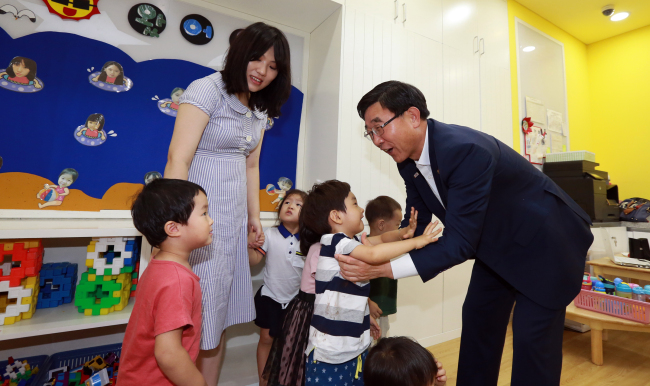Only about 20 percent of Korea’s kindergartens offer early morning programs, leaving working parents with the sole option of sending their children to day care centers instead, a study showed Monday.
According to the study, which surveyed 524 kindergartens and 631 day care centers nationwide, only 105 of the kindergartens offered early morning classes for children, and the classes on average started at 8.45 a.m. The programs at day care centers on average started about an hour earlier, at 7:42 a.m.
Early-morning programs have been popular among working Korean parents, who drop off their children at institutions before going to work. According to the study, day care centers on average close at 7:29 p.m., and 28.1 percent of the surveyed institutions offered programs even after their regular closing hours. Kindergartens, in comparison, mostly ran from 8:45 a.m. until 2:15 p.m.
 |
| Labor Minister Lee Ki-kwon visits a day care center located inside an industrial complex in Seoul to spend time with children. The Labor Ministry recently announced its plan to establish more day care centers at industrial complexes to support children of factory workers, as well as to guarantee contract workers‘ rights to parental leaves. (Yonhap) |
While day care centers offer early morning classes as well as late-evening programs, kindergartens are more popular among parents with children aged 4-5, according to government statistics.
Last year, 278,000 children aged 5 attended kindergartens, while only 162,000 children of the same age were placed in day care centers.
Kim Eun-seol, a researcher at the Korea Institute of Child Care and Education, said this is because kindergartens offer programs that are more educational, while day care centers’ programs tend to focus more on nurturing and basic care. “Parents of children aged 4-5 prefer kindergartens because they want their kids to be prepared academically before entering elementary school when they turn six,” Kim told The Korea Herald.
All kindergartens nationwide are regulated by Korea’s Ministry of Education, and therefore all of its teachers are required to have university or college degrees in early childhood education.
Day care centers, on the other hand, are regulated by the Welfare Ministry. The minimum qualification to become a day care center worker is a high school diploma.
According to Kim’s study, kindergarten teachers on average make about 1 million won ($857) more than day care workers monthly. The average monthly salary of kindergarten teachers was 2.74 million won, while that of day care workers was 1.81 million won.
Tuition fees for private kindergartens are generally higher than at private day care centers.
“It’s over-generalizing to say kindergartens are better than day care centers,” researcher Kim said.
“There are so many kinds of day care centers. Some of them are public, while some of them are private. The quality of the programs as well as the teaching staff are all different by each and every institution. I think day care centers can be a great option for working parents as long as they find the right ones that fit their children’s needs.”
Kim’s study also found that workers and teachers at public institutions — both kindergartens and day care centers — work significantly fewer hours but are paid more than those who work at private institutions.
For example, teachers at public kindergartens on average worked 8 hours and 35 minutes daily, while those at private kindergartens worked 10 hours and 23 minutes each day.
Teachers who have worked at public kindergartens for at least eight years were making 3.36 million won monthly as of last year, while those at private kindergartens with the same work experience were making 2.07 million won.
Day care center workers were making less than kindergarten teachers, with 2.14 million won every month for those in public and 1.42 million won for those at private ones.
A day care center employee who wanted to remain anonymous said if she had kids of her own in the future, she would choose to send them to kindergartens. Having a degree in early childhood education, she had worked as a teacher at a private kindergarten before taking her current position at a public day care center.
“I’m not saying day care centers are bad. The one I’m working at offers decent educational programs on top of the nursery care,” she said.
“But having to work long hours at day care centers makes it difficult for the staff to plan their classes ahead of time. At kindergartens, where classes end early, it’s relatively easier for teachers to think about what they want to do the next day and put extra effort into the curriculum.”
Yoon Ji-young, a working mother, sent both of her children — now seven and 11 — to kindergartens. Yoon said she was only able to so because her mother-in-law helps with child care at home. “I just wasn’t very comfortable with the idea of my kids spending too much time at a day care center,” she said.
“If they are going to play (than attend some kind of educational program), I thought it was much better to do it at home instead, with their sibling and grandmother than at an institution. But I think I wouldn’t have had the choice but to send my kids to day care centers if my mother-in-law’s help wasn’t available.”
By Claire Lee(dyc@heraldcorp.com)

